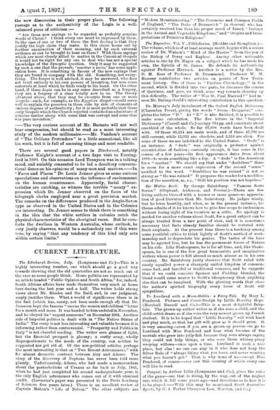The Expositor. Vol. V., Fifth Series. (Hodder and Stoughton.)— The
volume, which is of at least average merit, begins with a severe review of Dr. Watson's "Mind of the Master" from the pen of the Bishop of Derry and Raphoe. Among other noticeable articles is one by Dr. Mayor on a subject which he has made his own, the Epistle of St. James. He defends its authenticity against Professor Harnack. Another is a notice by the Rev. D. M. Ross of Professor H. Drummond. Professor W. M. Ramsay contributes two articles on points of New Testa- ment history. One of these is "Pauline Chronology ; " in the second, which is divided into two parts, he discusses the census of Quirittus, and goes, we think, some way towards clearing up this difficulty. The writer of" Was St. Paul Married ? " had ne seen Mr. Baring-Gould's interesting contribution to this question..
Dr. Murray's July instalment of the Oxford English Dictionary (Clarendon Press), giving the words " Doom—Dziggetai," com- pletes the letter "D." As " E " is also finished, it is possible to make some calculation. The five letters in the "Imperial Dictionary" (Cassell and Co.) occupy 934 pp. and constitute about one-third of the whole. So far 97,608 words have been dealt with. Of these 66,254 are main words, and of these 47,786 are still current, while 15,952 are obsolete, and 2,516 are alien. For some of these we are indebted to the United States. " Dude " is an instance. A " dude " was originally a protester against eccentricities of fashion; curiously enough, it has come in the course of a few years—its first appearance dates from about 1833—to mean something like a fop. A " dude " is the American for a "masher." We should say that under "doubtless" there is room for a more exact expression of the second "sense" ascribed to the word. "Doubtless he was ruined" is not so strong as "He was ruined." It prepares the reader for a modifica- tion of the assertion, as, e.g.," Still his position was not hopeless."


































 Previous page
Previous page